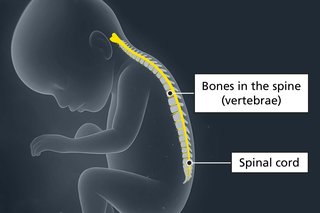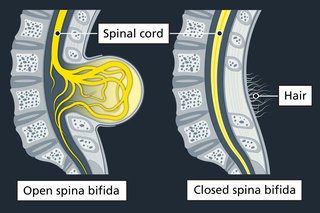Spina bifida

Multimedia Team - nhs.uk
Types of spina bifida

Multimedia Team - nhs.uk
There are 2 main types of spina bifida.
| Types | What it means |
|---|---|
|
Open types of spina bifida (myelomeningocele and meningocele) |
Where your spinal cord, or the tissue around it, pushes out of a gap in your spine. This is a less common but usually more serious type of spina bifida. It can be spotted in pregnancy and people with it usually need treatment and long-term support to manage the symptoms. |
|
Closed types of spina bifida (including occulta and lipomyelomeningocele) |
Where there's a small gap in your spine, but it’s covered with skin so your spinal cord does not push outwards. Most people do not know they have it because they do not have symptoms. Some people can have problems such as pain or numbness and need treatment. |
Symptoms of spina bifida
Symptoms of spina bifida are caused by damage to the spine, spinal cord, brain and nervous system while a baby is still in the womb.
How severe the symptoms are will depend on where the damage is on the spine and what type of spina bifida it is.
Symptoms of open spina bifida include:
- weakness in your legs that makes it difficult to walk, or not being able to walk at all (paralysis)
- difficulty controlling when you pee or poo (incontinence)
- a build-up of fluid on your brain (hydrocephalus), which can damage the brain and cause learning difficulties
- loss of feeling in your legs and around your bottom, so you may not feel pain or hot or cold
- your bones not developing properly, such as having a curved spine (scoliosis)
Symptoms of closed spina bifida include:
- pain or numbness in your legs or back
- weakness in your legs
- fatty lumps, a hairy patch or deep dimples on your back when you’re born
- difficulty controlling when you pee or poo (incontinence)
Closed spina bifida may not cause any symptoms.
Causes of spina bifida
It is not known exactly what causes spina bifida, but some things can increase the chances of a baby being born with it.
These include:
- not getting enough folic acid or vitamin B12 during pregnancy
- having a close family member with spina bifida
- taking some medicines during pregnancy such as sodium valproate or carbamazepine, which are used to treat epilepsy and some mental health conditions
Folic acid in pregnancy
Find out how much folic acid and other vitamins you might need in pregnancy
Tests for spina bifida
If you’re pregnant, the 20-week screening scan will check if your baby may have open spina bifida.
If the scan suggests your baby has it, you’ll be offered more tests to confirm it’s spina bifida and check for other problems.
If tests confirm that your baby has open spina bifida, a doctor will talk to you about what that means for the health of your child and what support they may need in the future.
They will also talk to you about your options to end your pregnancy if you chose to.
Closed spina bifida
Closed spina bifida is not usually found during pregnancy scans.
Some types of closed spina bifida, such as lipomyelomeningocele, may be diagnosed when you’re born if you have a lump or dimple on your back.
Milder types of closed spina bifida, such as spina bifida occulta, can be diagnosed by a scan of your spine such as an X-ray, MRI or CT scan.
But because they do not usually cause symptoms, they're often only diagnosed when you’re having a scan for another reason, such as after a back injury.
Treatment for spina bifida
Surgery to the spine is the main treatment for open spina bifida.
It will not reverse nerve damage, but it can close up the spine, prevent more damage and remove any fluid on the brain (hydrocephalus).
Closed spina bifida does not usually need treatment, although sometimes surgery is needed.
You may also need long-term treatment and support to manage symptoms of spina bifida.
Surgery to close the spine
Babies with open spinal bifida will need surgery to push the spinal cord back into their spine and close the gap in their spine.
Surgery can be done:
- after your baby is born, usually within 48 hours of their birth
- while your baby is still in the womb, usually before you’re 26 weeks pregnant
A specialist team will talk to you about the treatment options for your baby, including any risks.
Surgery for fluid on the brain (hydrocephalus)
Babies with open spina bifida often have a build-up of fluid on their brain (hydrocephalus).
They will need surgery to have a thin tube (shunt) put in their brain to drain the fluid into other parts of the body.
The shunt will need to stay in place for the rest of their life. They may need more surgery to replace the shunt if it gets infected or stops working properly.
Treatment and support for symptoms of spina bifida
There is treatment and support available for the symptoms of spina bifida. Every person's needs will be different depending on their symptoms.
Support you might need includes:
- physiotherapy to help with movement, prevent bone problems and muscle loss
- occupational therapy to help you carry out everyday activities and become more independent
- mobility aids to help you walk or move around, such as wheelchairs, leg splints and braces
- surgery for bone and joint problems (orthopaedic surgery) such as the hip joint moving out of place (hip dislocation) or club foot (where the feet turn inwards)
- treatment for problems peeing (urinary incontinence) and problems pooing (bowel incontinence)
- self-care advice for looking after your joints, skin and feet
Find out more
How spina bifida affects your life
How much spina bifida affects your life depends on the type you have.
If you have closed spina bifida, treatment can usually help manage any symptoms you have.
Having open spina bifida can have a big impact on a person's life.
Most people born with open spina bifida live to be adults and can live full lives. But they may need support to walk or move around and manage everyday life and symptoms.
Most children can go to a mainstream school, with some support. But some children will have learning disabilities and need support at a specialist school.
Many people with open spina bifida can have children.
Find out more
Help and support for spina bifida
Spina bifida can be a difficult condition to live with, both physically and emotionally.
As well as support from health professionals, you may find it helpful to get support from other people with spina bifida or national charities such as Shine and The Brain Charity.
Shine
Information and support for anyone affected by spina bifida and hydrocephalus. You will need to be a member to use some services, but membership is free.
The Brain Charity
Information and support for anyone with a condition affecting the brain, spinal cord or nervous system (neurological condition).
- Website: www.thebraincharity.org.uk
- Telephone: 0151 298 2999
- The Brain Charity: get help
Recording information about you and your condition
If you or your child has spina bifida, your care team will pass information about you or your child onto the National Congenital Anomaly and Rare Disease Registration Service (NCARDRS).
This helps scientists look for better ways to prevent and treat this condition. You can opt out of the register at any time.
Page last reviewed: 16 October 2025
Next review due: 16 October 2028